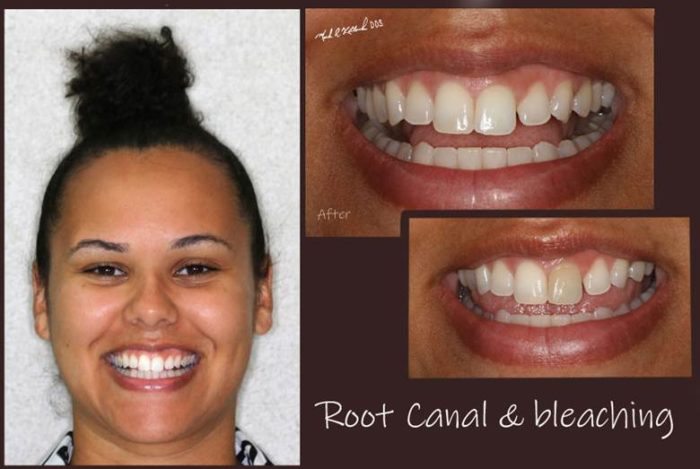Appointment
Today
Signs that you may need root canal therapy include symptoms such as gum swelling, temperature sensitivity to cold or hot drinks, pressure sensation, fever, pain, and sleepless nights. Inflammation of the nervous tissue, within the hollow center of a tooth, is the reason for this discomfort.
Good news — this Houston dentist will provide pain relief. Symptoms can be quickly alleviated with root canal therapy at this Houston, TX dental office. Endodontic treatment also known as “root canal” is a procedure that cleans away the inflamed tissue that causes pain or discomfort within a tooth. It’s a safe and effective treatment to resolve discomfort. In most toothache situations, endodontic therapy is an alternative to an extraction. Root canal provides relief of discomfort and saves teeth, preserving both your smile and ability to chew.
Root canal treatment can relieve soreness and swelling caused by an infected or abscessed tooth. Endodontic therapy is a process where the soft tissue within a tooth is removed and replaced with a natural organic filling material called gutta-percha. Afterward, the tooth and surrounding tissue become healthy and comfortable. Treatment is efficient, with new technology, in most case Dr. Kotlarek is able to complete endodontic treatment in a single visit.
The words “root canal” have inspired many comedy bits and have wrongly become synonymous with pain and suffering. In reality, root canal therapy is comfortable and a predictable way to relieve pain and save teeth that would otherwise need to be extracted. Sensitive, broken, and seemingly hopeless teeth are frequently saved and made comfortable with this common procedure.
With a focus on comfort, in Houston, Dr. Kotlarek delivers same-day toothache relief. For over twenty years this dental office on Memorial Drive near Dairy Ashford has worked to make the root canal experience pleasant and predictable – not painful.
If you or your loved one has a toothache and must consider extraction versus root canal therapy, it’s important to know that root canal treatment is over 90% successful in preserving the long-term service of a tooth. Further, root canal treatment delivers immediate relief of pain from cold and hot foods and beverages.
Yes, sedation is available. It is a good option to relieve anxiety and provide comfortable dental care. Dr. Kotlarek provides nitrous oxide, oral sedation and for a completely relaxed experience, IV sedation. With IV sedation patients have very little memory of their dental visit or the passage of time in the dental office.

Yes, if a tooth is traumatized, from a sports injury, for example, it may slowly become darker than the adjacent teeth. This happens because the blood supply that naturally flows within the center of a tooth is disrupted. As a result of the injury, the iron within red blood cells soaks into the tooth structure, causing darkness.
Fortunately, if a dark tooth is treated early with a combination of root canal therapy and internal bleaching, the tooth can look and function properly. In the case of a dark tooth, it’s very important to see your dentist as soon as possible. This is because teeth that get dark usually develop a solid mass within the central portion of the tooth. Once this solidification, known as a calcified pulp chamber, occurs, the tooth can no longer be whitened. Additionally, if an infection forms in a dark and calcified tooth, root canal therapy cannot be accomplished and extraction may be necessary.
Some side effects following root canal therapy are common but temporary. They include the same symptoms that initially caused you to seek treatment, such as gum tissue swelling or jaw soreness. After completing root canal therapy, it’s common to have pressure sensitivity for a few days. In almost all cases, 7 – 14 days following treatment, chewing will be comfortable and the tooth should feel completely normal.
Common side effects following root canal treatment include:
Multiple days of discomfort, swelling, or fever can occur but are very rare. Most often your dentist will prescribe an antibiotic that will reduce or prevent lingering side effects. After endodontic therapy, if you experience prolonged tooth or gum sensitivity, it’s important to contact your dentist as soon as possible for evaluation.
Teeth are designed to last a lifetime. Early treatment and prevention are the keys to achieving dental health and well-being. Following root canal therapy, a patient said: “The root canal treatment was like throwing water onto the fire that was my toothache.” For a consultation, please contact us today!
Book Now 24/7Roman Dental on Memorial Drive in West Houston specializes in quickly stopping pain and making people feel relaxed and comfortable. Roman Dental repairs broken front teeth with cosmetic dental bonding, veneers, and ceramic crowns. Even teeth that must be extracted can be replaced with or without dental implants by Dr. Kotlarek and his team of dental technicians. Roman Dental offers same-day appointments to resolve toothaches and problems with sensitivity and discomfort. Additionally, this emergency dental care office provides root canal therapy, night guards for clenching, medicated fillings, and extractions when necessary.